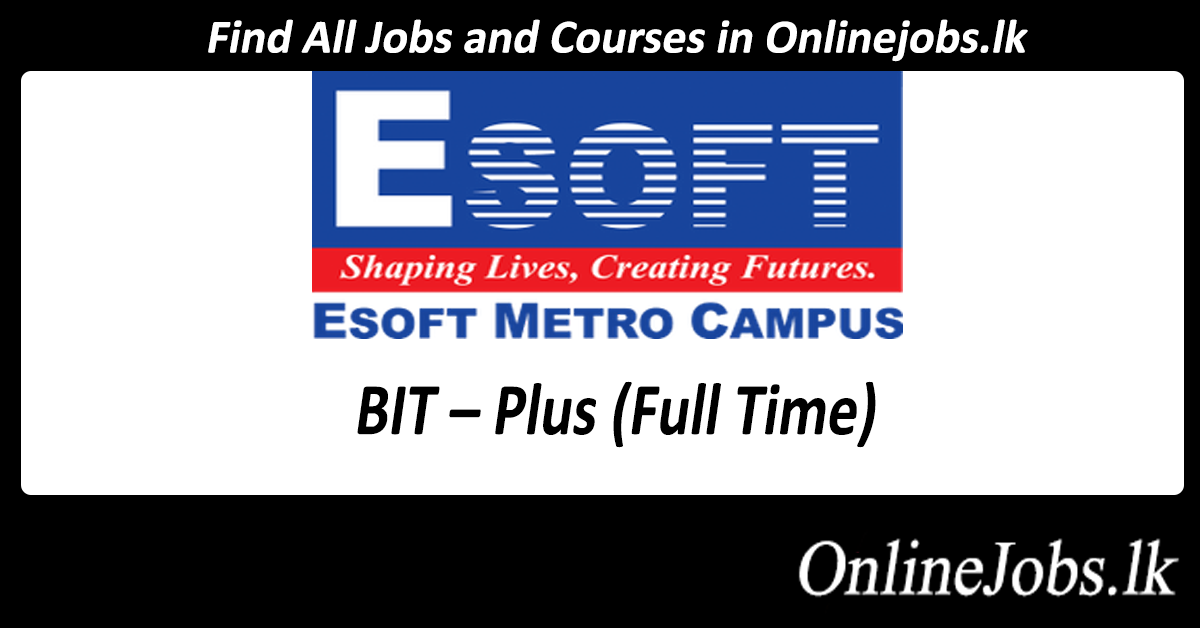BIT is the most sought after yet cost effective Academic Degree (External) Programme from the University of Colombo School of Computing (UCSC) since the year 2000 in SriLanka. ESOFT is Sri Lanka’s #1 BIT Trainer having produced the largest share of passed out graduates including 15+ first class degree holders and 13 Gold medalists year after year.
Full time Degree programme covers the entire BIT Degree, including internationally recognized job oriented programmes. Lectures are conducted from Monday to Thursday from 9:00AM – 4:00PM
- School leavers After A/L`s (students who are waiting results can apply)
- IT Practitioner’s looking for IT Degree
- Those who wish IT as career path
Entry Requirements
-
- C Passes for O/L Mathematics and English
+
- 3 Passes for Advanced Level (in one sitting) OR
- Successful completion of FIT-UCSC OR
- Equivalent Qualifications + e-Selection Test
Value Added Contents
- Diploma in Web Engineering ( Pearson Assured)
- Diploma in Software Engineering( Pearson Assured)
- Diploma in Hardware & Networking( Pearson Assured)
- Android App development with Java ( Pearson Assured)
- Cert in Java Programming
- Project Class
- Project guidance (For the Final Year Project)
- Job Placement Support in Recognized IT organization
Year 01- Diploma in Information Technology
Syllabus (Semester 01 & Semester 02)
| YEAR 1 (All Compulsory with continuous assessments) | |||
| Code | Name | Credits | Semester |
| IT1105 | Information Systems & Technology | 3 | 1 |
| IT1205 | Computer Systems | 3 | 1 |
| IT1305 | Web Application Development I | 3 | 1 |
| EN1101 | Communication Skills | 3 | 1 |
| EN1201 | Introductory Mathematics | 2 | 1 |
| EN1301 | Personal Computing | 2 | 1 |
| IT2105 | Mathematics for Computing I | 3 | 2 |
| IT2205 | Programming I | 4 | 2 |
| IT2305 | Database Systems | 4 | 2 |
| IT2405 | Systems Analysis & Design | 3 | 2 |
| 30 | |||
Year 02-Higher Diploma in Information Technology(HDIT)
Syllabus(Semester 03 & Semester 04)
| YEAR 2 (All Compulsory with continuous assessments) | |||
| Code | Name | Credits | Semester |
| IT3105 | Object Oriented Analysis & Design | 3 | 3 |
| IT3205 | Fundamentals of Software Engineering | 3 | 3 |
| IT3305 | Mathematics for Computing II | 3 | 3 |
| IT3405 | User Interface Design | 3 | 3 |
| IT3505 | Web Application Development II | 4 | 3 |
| IT4105 | Programming II | 4 | 4 |
| IT4205 | Information Technology Project Management | 3 | 4 |
| IT4305 | Rapid Software Development | 4 | 4 |
| IT4405 | Data Communication & Networks I | 3 | 4 |
| 30 | |||
Year 03-Bachelor of Information Technology(BIT)
Syllabus(Semester 05 & Semester 06)
| YEAR 3 (Select all Compulsory (C) and Select optional (O) subjects to complete 30 credits) | ||||
| Code | Name | Credits | Semester | Select |
| IT5105 | Professional Issues in IT | 3 | 5 | C |
| IT5205 | Information Systems Security | 3 | 5 | C |
| IT5305 | Computer Systems II | 3 | 5 | C |
| IT5405 | Fundamentals of Multimedia | 3 | 5 | O |
| EN5101 | Fundamentals of Management | 2 | 5 | C |
| IT6105 | Software Development Project | 5 | 6 | C |
| IT6205 | Systems & Network Administration | 3 | 6 | C |
| IT6305 | Database Systems II | 3 | 6 | C |
| IT6405 | e-Business Application | 3 | 6 | 0 |
| IT6505 | Middleware Architecture | 3 | 6 | 0 |
| EN6101 | Introduction to Entrepreneurship | 2 | 6 | c |
| 34 | ||||
Duration
3 years(All Six semesters)
ESOFT Course Fee
Rs. 349,000 (All 6 Semesters)
Payable as installments: Rs. 37,000 + (Rs. 13,000 x 24)
University Fee
(All Three years)
(Including Registration & Examination)
| Year1 | Year2 | Year3 | TOTAL | |
| Application Processing (when applying) |
1,000 | 1,000 | ||
| Annual Registration (For new students) |
2,750 | 3,300 | 3,850 | 9,900 |
| Course examination (Each course) |
1,200 | 1,500 | 1,800 | |
| Course examination (Enhancement course) |
1,500 /1200* | |||
| Year Examination (minimum) |
13,800 | 12,000 | 9,000 | 34,800 |
| Project registration Fee (Proposal & Dissertation submission) |
6,000 | 6,000 | ||
| TOTAL (minimum) | 17,550 | 15,300 | 18,850 | 51,700 |
Certification
Awarded by University of Colombo School of Computing. & ESOFT
Assessment Method
Test,Assignment & Practical
Useful links
Syllabus
Fees and Payment Methods
BIT Hand Book
BIT Programme is designed to:
- Produce qualified ICT professionals in addition to the traditional University output
- Set professional standards and encourage students to obtain skills in commercial ICT applications and in the usage of necessary tools
- Enable those who could not enter the university to read for a degree in ICT due to severe competition to work towards obtaining such a degree
- Give an opportunity to those non-graduates already working in ICT to obtain a formal qualification in ICT through self-study.

